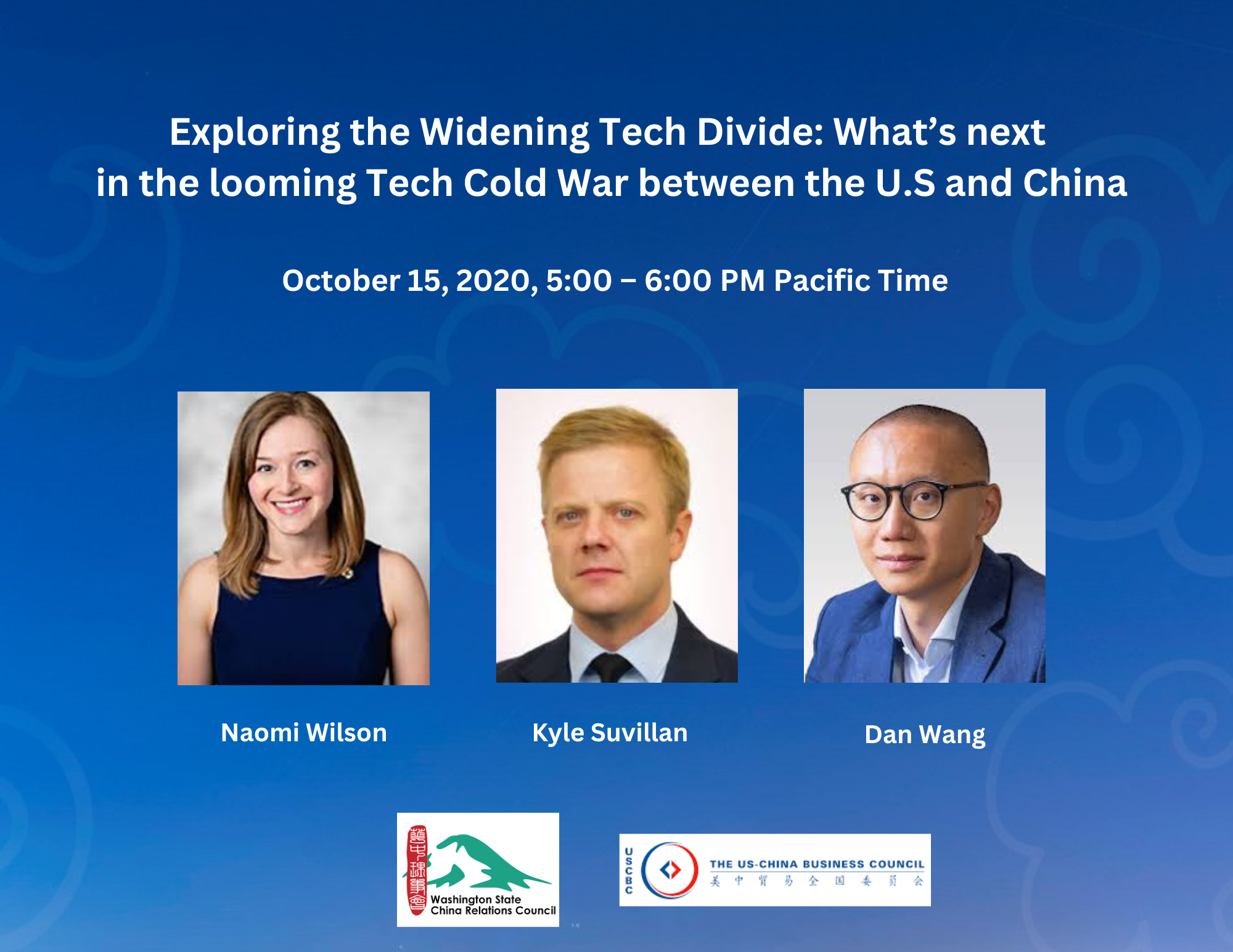
Exploring the Widening Tech Divide: What’s next in the looming Tech Cold War between the U.S and China
Almost daily either the U.S. or Chinese government announce new restrictions on technology transfers. This rapidly changing environment poses a challenge to companies—both U.S. and Chinese—as they attempt to navigate national technology policies and geo-political tensions. In this webinar, we will examine some of the actions that led to today’s looming tech cold war, highlight the current state of play regarding tech transfers, and discuss the implications of the widening technological divide for companies. Specifically, our panelist will outline actions taken in the U.S. to limit technology transfers, and will dig into China’s policies toward boosting self-sufficiency in strategic tech-focused industries. Our panelists, based in Beijing and Washington, D.C., will bring perspectives from their work with companies in both China and the U.S.
Panelists
Naomi Wilson serves as senior director of policy, Asia at the Information Technology Council (ITI). Prior to joining ITI, Naomi served at the U.S. Department of Homeland Security, where she most recently held the position of acting director for Asia-Pacific. In that capacity, she played a leading role on cybersecurity, law enforcement, and customs cooperation issues related to Asia and served as a senior advisor to Secretary Jeh Johnson. During her tenure at DHS, Naomi led development and implementation of priority policy initiatives for DHS engagement with China, including secretarial engagements and agreements. She worked closely with interagency colleagues to negotiate and implement agreements stemming from the September 2015 State visit between Presidents Barack Obama and Xi Jinping, including managing the U.S.-China High-Level Dialogue on Cybercrime and Related Issues for DHS.
Prior to joining DHS, Naomi served as a staffer on the Senate Committee on Homeland Security & Governmental Affairs and as a research assistant at the Center for Strategic & International Studies (CSIS).
Kyle Sullivan is China Practice Lead at Crumpton Group, where he oversees analysis, business development, and project conceptualization and delivery for CG’s China-related advisory work.
Prior to joining CG, Kyle spent 12 years as a consultant in Shanghai. Throughout his career, he has advised multinational corporations in China on market entry, reputational due diligence, and government affairs. At APCO Worldwide, a global public affairs firm, Kyle developed government relations strategies for US Internet technology and financial services companies. He has expertise in inbound and outbound Chinese investment policy, having managed policy research at the US-China Business Council’s Shanghai office. Kyle began his career as a risk intelligence analyst at Hill & Associates, a Hong Kong-based risk management firm, supporting US software and manufacturing firms on asset protection and due diligence.
Dan Wang is a Technology Analyst at Gavekal, one of the World’s leading independent providers of global investment research. Dan writes on China’s technology progress and how it’s affected by U.S. sanctions. In particular, he tracks China’s semiconductor capabilities, U.S. measures on CFIUS and export controls, Huawei’s ongoing struggles, supply chain relocation, and broader Chinese industrial policy. His work is widely cited in press. Dan previously worked in Silicon Valley and studied philosophy at the University of Rochester. Dan is also a contributor to Bloomberg Opinion.
Moderator
Antonio Douglas is a Business Advisory Services Manager at the US-China Business Council’s Beijing Office, where he provides regular updates on timely research into China’s cybersecurity and data policies. Antonio graduated from the College of William and Mary in 2014 with a Major in Chinese and Minor in Process Management & Consulting. From 2014-2016 Antonio lived in Chengde, Hebei Province and taught at the Hebei Normal University for Nationalities as an ESL teacher. Following his time in Chengde, Antonio attended Nankai University under the Chinese Government Scholarship and received a M.A. in International Relations. After four years studying the language, Antonio wanted to experience China for himself and decided to teach English in Hebei Province.